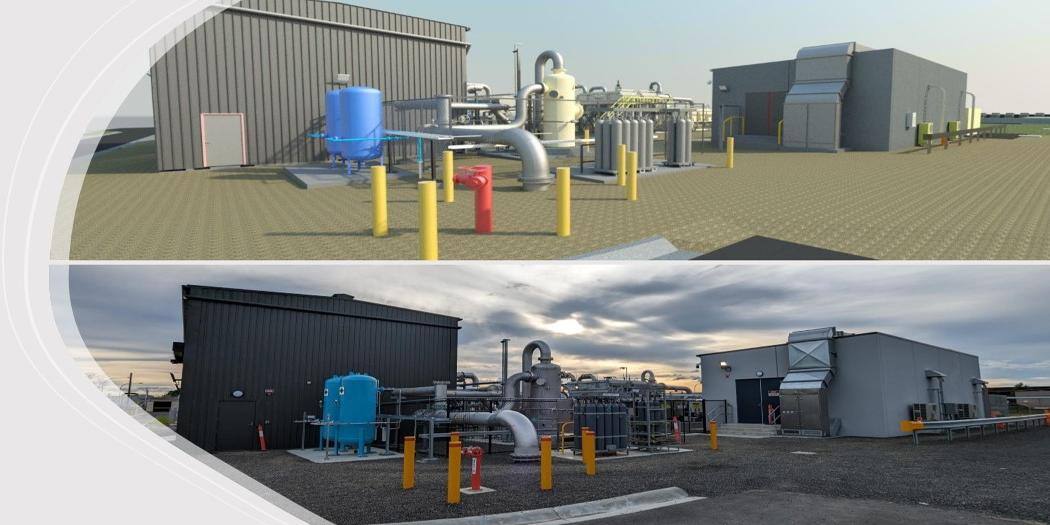Innovative biogas upgrade a boon for energy generation and sustainability

An advanced biogas upgrade is driving renewable energy production, boosting operational safety, cutting emissions, and enhancing long-term efficiency to meet growing demands and ambitious net zero targets.
Sponsored by SMEC, the Infrastructure Project Innovation Award (Metro) was bestowed to Melbourne Water and John Holland-KBR Joint Venture at Ozwater’24 for the outstanding work on the Eastern Treatment Plant Biogas Handling System Stage 1 Upgrade project.
The Australian Water Awards stand to recognise innovation and excellence within the water community, with nominations for NSW and ACT project awards still open.
Upgrades to the Eastern Treatment Plant Biogas Handling System have maximised biogas conversion to bioenergy to deliver on Melbourne Water’s commitment to net zero, while also improving safety, production, reliability, longevity and ability to expand to address forecast population growth.
Melbourne Water Managing Director Dr Nerina Di Lorenzo said the recognition was a huge source of pride, with the project standing as an industry-leading example of delivering on operational requirements, while ensuring social, economic and environmental benefits.
“Melbourne Water, and the projects that we help deliver, aim to protect the natural resources that sustain us – so Melbourne remains a great place to live today, tomorrow and for generations to come,” she said.
“I’m continually in awe of the outstanding work that our people undertake alongside our partners to enhance Melbourne’s water supply network and infrastructure.
“Receiving this important industry recognition is testament to the commitment our people have to the innovative projects that we deliver daily. Whether it’s a win or a nomination, I’m very proud of the work we undertake and congratulate everyone involved.”
Benefits abound
Melbourne Water Executive General Manager Service and Asset Lifecycle Craig Dixon said the primary objective of the project was to upgrade the existing biogas handling system to maximise the potential for renewable electricity generation, but there have been plenty more benefits from the upgrades.
“Asset safety, operability and maintainability, increased plant availability, reliability and automation were also considerations,” he said.
“Broader motivations for this project include reducing our Scope 1 and Scope 2 greenhouse gas emissions, reducing operating costs, such as grid electricity, and improving the longevity of the power station engines through improved biogas feed quality.”
Dixon said increased power generation from biogas is important to Melbourne Water, as it reduces our reliance on non-renewable energy sources.
“We can increase the proportion of energy generated in-house using a sustainable feedstock, leading to more control over the plant’s energy mix. The success of this project places us one step closer towards our net zero targets,” he said.
Specific upgrades to the new biogas handling system included gas compressors, an inlet separator, aftercoolers and a moisture removal system.
“All of these systems are located above ground to improve asset and personnel safety compared to the old system,” Dixon said.
“Building a new plant while keeping the existing one running was always going to be a challenge. Using piping hot taps for low-pressure sludge gas tie-ins, we reduced the power station outage time, a critical shutdown, by 48 hours.
“From a design perspective, implementing a hot standby compressor greatly improved plant availability through automation.”
Hitting the mark
While the results of the upgrade are impressive, so was the ability to deliver given the challenging condition, Dixon said.
“Working in and around hazardous areas under conditions in a major hazard facility required a higher level of safety and change management engagement than usual,” he said.
“This meant that significant time and effort from multiple stakeholders was expended to enable construction methodologies and operations and maintenance documentation to be developed appropriately.
“Despite the project’s complexity and delivery during COVID, it was delivered safely on time, and under budget. It passed commissioning and proof of performance testing on the first attempt.”
Immediately after commissioning the new system, the Eastern Treatment Plant saw an increase in biogas being processed and delivered to the power station.
“This reduced our natural gas and grid electricity consumption and associated costs,” Dixon said.
“We made a notable effort to optimise the biogas system and its interface with waste gas burners and power station engines. This work led to a higher level of automation and product quality than originally expected.
“Ultimately, this was a highly successful project that delivered its intended benefits to the great satisfaction of operators and our wider business.”
Want to learn more about the Australian Water Association’s awards? Take a look at how to get involved here.

